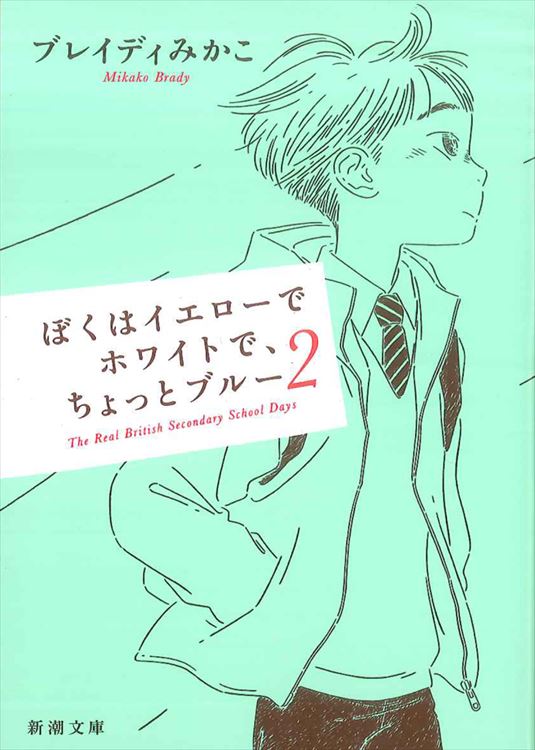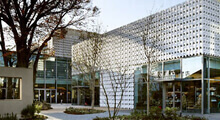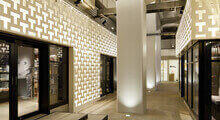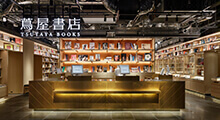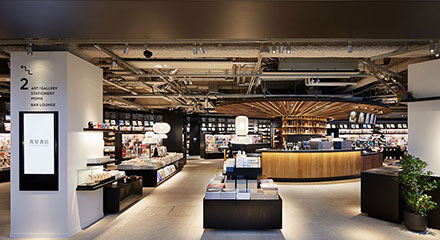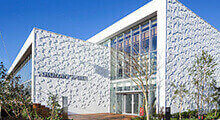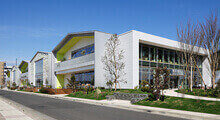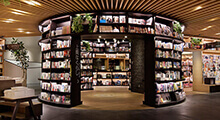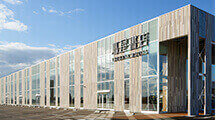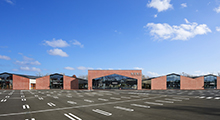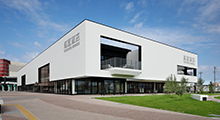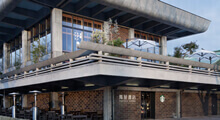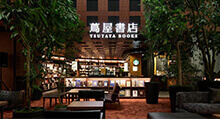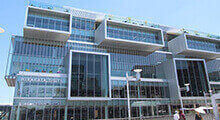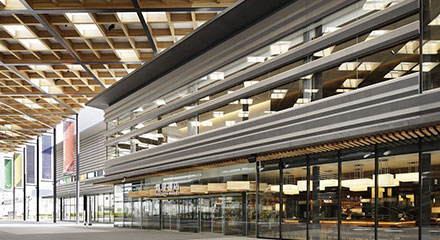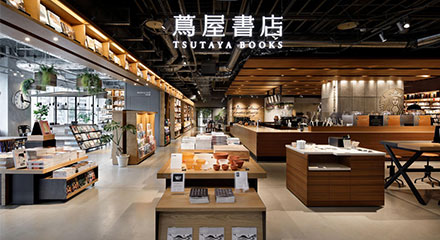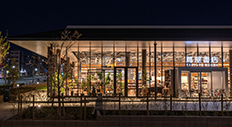[283rd] Michiko Mamuro's bookshelf "I'm Yellow, White, and a Little Blue 2" by Mikako Brady / Shincho Bunko
Known as the "original charismatic bookseller," DAIKANYAMA TSUTAYA BOOKS, who recommends books in a variety of media including magazines and TV.
In this series, we take a peek into the "bookshelves" in the mind of our most popular concierge.
Please enjoy it along with his comments.
* * * * * * * *
"I'm Yellow, White and a Little Blue 2"
Brady Mikako/Shincho Bunko
Click on the image to go to the purchase page.
Click on the image to go to the purchase page.
* * * * * * * *
This is a continuation from last week's book review of the non-fiction book "I Am Yellow, White and a Little Blue," part 282.
What surprised me in the first part was, "British education is amazing." This is not about getting good grades.
First, kindergarten. In the early childhood education curriculum established by the government, there are various "developmental goals that should be reached by the time children start school at age 4," and one of the teaching guidelines is "communication and language." While showing posters, they teach children that the smiling faces show "happiness" and "fun," and that the angry faces show anger. It's naive to think, "That's something humans can do naturally." This is the story of the reality that "I" saw during my experience working at a nursery school.
In addition, the introduction of "citizenship education" is mandatory for junior high school students in the UK public school education. It literally means "education for citizens". From the nature of democracy, politics, parliament, and law, to the importance of budgets (this is a tough one). From the age of 11, students are drilled into what it means to be a citizen!
While I thought that was amazing, when it came to the scene about "the issue of relaxed and crowded conditions at swimming meets," I was impressed in a way that they don't make things equal in these situations.
In the first film, the son and "I" have heart-wrenching experiences with friends, parents, teachers, and Japanese people who came back to "Mom's country" during the summer vacation, but in the second film, the problems seem deeper and more familiar. It makes you think as much as Michael Sandel's heated philosophy lectures.
For example, my spouse (my husband is referred to by this simple name in part 2!) tells the Romanian immigrants who collect scrap metal that we will put the scrap metal we produce next to the waste bin in the yard and that they can take it as they like.
But one day, the neighbors complained: "The Romanians are not only taking our things, but also things from our neighbors' houses that we don't intend to throw away." The request to stop them from coming is evident in every word of this statement. So, if you were the spouse, what would you do?
In part 2, I think to myself, "How rich we are." My spouse, "I," and my son talk about this with the family.
We live in what is generally called a "rough area." I'm a writer, and my spouse is a dump truck driver who "pushes his worn-out body, drives all night, and gets a pittance on wages." We're not wealthy. But this house is rich in words. There's a bond between parent and child that weaves together various perspectives.
Last week, in the 282nd issue, I wrote that the son "has the ability to see into the future." He goes one step further than what everyone else would think, and he senses and thinks. This is the highlight of Part 2. What moved me the most was the TV election program.
With the general election just around the corner, a debate between party leaders was broadcast on Channel 4 in the UK. The theme was "climate crisis." There was also a large-scale demonstration by teenagers worried about the future (as I wrote last time, "civic education" is thoroughly taught from middle school onwards in the UK!), and measures to combat global warming were a key policy point. There were seven podiums on the show, and five party leaders appeared. The party leaders who were absent were known to have no interest in environmental issues, and declined to appear.
So what did the TV station do? They placed a huge piece of ice in the shape of the Earth where the two were supposed to sit. While the five party leaders who agreed to appear on the show tried to appeal to everyone, the Earth started to melt away!
"Wow, as expected from a British TV station. That's a great black joke!" That's what everyone would have left it at. But what did the son who was watching TV with "me" think was one step further?
I was impressed by his young eyes that look beyond the past, such as the reason he cried when his father told him, "Don't end up like me," and the issue of homeless people being turned away from an evacuation center in Taito Ward during the heavy rains of Typhoon Hagibis, which was more widely reported in the UK than in Japan. That strength sometimes hurts, but he keeps lifting his head.
We hope that parents and children will read both volumes 1 and 2 during the summer vacation. And as we advertised last time, volume 2 comes with an end commentary by our store's Yumiko Miyadai. Don't miss it!
What surprised me in the first part was, "British education is amazing." This is not about getting good grades.
First, kindergarten. In the early childhood education curriculum established by the government, there are various "developmental goals that should be reached by the time children start school at age 4," and one of the teaching guidelines is "communication and language." While showing posters, they teach children that the smiling faces show "happiness" and "fun," and that the angry faces show anger. It's naive to think, "That's something humans can do naturally." This is the story of the reality that "I" saw during my experience working at a nursery school.
In addition, the introduction of "citizenship education" is mandatory for junior high school students in the UK public school education. It literally means "education for citizens". From the nature of democracy, politics, parliament, and law, to the importance of budgets (this is a tough one). From the age of 11, students are drilled into what it means to be a citizen!
While I thought that was amazing, when it came to the scene about "the issue of relaxed and crowded conditions at swimming meets," I was impressed in a way that they don't make things equal in these situations.
In the first film, the son and "I" have heart-wrenching experiences with friends, parents, teachers, and Japanese people who came back to "Mom's country" during the summer vacation, but in the second film, the problems seem deeper and more familiar. It makes you think as much as Michael Sandel's heated philosophy lectures.
For example, my spouse (my husband is referred to by this simple name in part 2!) tells the Romanian immigrants who collect scrap metal that we will put the scrap metal we produce next to the waste bin in the yard and that they can take it as they like.
But one day, the neighbors complained: "The Romanians are not only taking our things, but also things from our neighbors' houses that we don't intend to throw away." The request to stop them from coming is evident in every word of this statement. So, if you were the spouse, what would you do?
In part 2, I think to myself, "How rich we are." My spouse, "I," and my son talk about this with the family.
We live in what is generally called a "rough area." I'm a writer, and my spouse is a dump truck driver who "pushes his worn-out body, drives all night, and gets a pittance on wages." We're not wealthy. But this house is rich in words. There's a bond between parent and child that weaves together various perspectives.
Last week, in the 282nd issue, I wrote that the son "has the ability to see into the future." He goes one step further than what everyone else would think, and he senses and thinks. This is the highlight of Part 2. What moved me the most was the TV election program.
With the general election just around the corner, a debate between party leaders was broadcast on Channel 4 in the UK. The theme was "climate crisis." There was also a large-scale demonstration by teenagers worried about the future (as I wrote last time, "civic education" is thoroughly taught from middle school onwards in the UK!), and measures to combat global warming were a key policy point. There were seven podiums on the show, and five party leaders appeared. The party leaders who were absent were known to have no interest in environmental issues, and declined to appear.
So what did the TV station do? They placed a huge piece of ice in the shape of the Earth where the two were supposed to sit. While the five party leaders who agreed to appear on the show tried to appeal to everyone, the Earth started to melt away!
"Wow, as expected from a British TV station. That's a great black joke!" That's what everyone would have left it at. But what did the son who was watching TV with "me" think was one step further?
I was impressed by his young eyes that look beyond the past, such as the reason he cried when his father told him, "Don't end up like me," and the issue of homeless people being turned away from an evacuation center in Taito Ward during the heavy rains of Typhoon Hagibis, which was more widely reported in the UK than in Japan. That strength sometimes hurts, but he keeps lifting his head.
We hope that parents and children will read both volumes 1 and 2 during the summer vacation. And as we advertised last time, volume 2 comes with an end commentary by our store's Yumiko Miyadai. Don't miss it!
* * * * * * * *
(Redirects to Yahoo! Shopping)
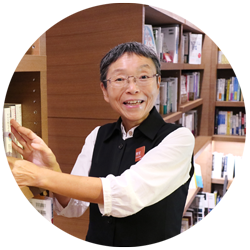
DAIKANYAMA TSUTAYA BOOKS Literature Concierge
Michiko Mamuro
【profile】
"The original charismatic bookseller" who recommends books in various media such as magazines and TV. Has serials in magazines such as Fujingaho and Precious. Active as a book critic, her paperback reviews include "The Pale Horse" (Agatha Christie/Hayakawa Christie Bunko), "Motherhood" (Minato Kanae/Shincho Bunko), "The Snake Moon" (Sakuragi Shino/Futaba Bunko), and "Staph" (Michio Shusuke/Bunshun Bunko).


